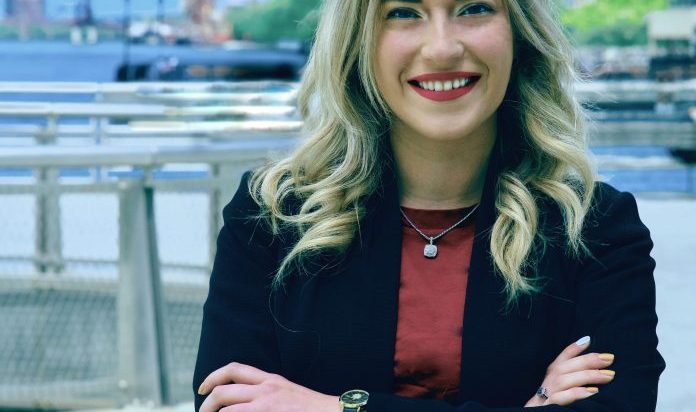How Columbia Engineering FinTech Boot Camp Helped a Former Accountant Go After Blockchain and Decentralized Finance

In 2016, after completing an undergraduate degree in public accounting from Fordham University’s Gabelli School of Business and working toward her CPA licensure, Alexis Schottenstein decided to pursue her postgraduate studies at the London School of Economics and Political Science (LSE). It was there that her whole world changed.
Alexis’s interest in digital finance began during a course on financial crime. In a lecture about money laundering, Alexis asked the professor about fraud monitoring protocols for Bitcoin, an unregulated currency. Her professor didn’t know whether anyone monitored the currency. At the time, Bitcoin regulation was undeveloped territory that Alexis was excited to explore.
“I went down the digital finance rabbit hole and have been tunneling ever since,” said Alexis.
When the time came to choose her dissertation topic, Alexis settled on cryptocurrency. Her education culminated in an exploration of capital markets, know your customer (KYC), anti-money laundering and audit regulations. Throughout this process, she realized that Bitcoin was only the tip of the iceberg. Behind it all was blockchain technology.
Exploring a blossoming interest in blockchain
Alexis’ research led her to pivot away from accounting and toward the emerging field of fintech. She secured a position in London at a R3, a blockchain software firm, working as a project management intern. But with her visa’s expiration date quickly approaching, Alexis knew she would have to leave her job. Unsure of her next move, she sought out opportunities to learn more about blockchain and coding.
“I realized during my time at R3 that I should learn to code in order to achieve my career goals,” said Alexis. “Especially since people told me not to — and I love a challenge.”
Her search led her to Columbia Engineering FinTech Boot Camp, one of the first-ever boot camps on the subject. “I jumped on that opportunity right away,” said Alexis. “It really was invaluable because the boot camp covered so many topics that I don’t think I would have been even introduced to on the job.”
Honing new technical skills
In the boot camp, Alexis developed an array of technical skills. She learned the Python, Solidity, and JavaScript programming libraries from scratch — and implemented those skills for financial modeling, time-series analysis and financial analysis.
In the next module, Alexis deep dived into machine learning (ML) applications in finance data and blockchain development. She also learned how to read technical documentation, which she considers crucial to learning about a new area. “Being able to sift through that is what I find most valuable,” said Alexis. “You can improve your technical skills just by reading the documentation.”
Alexis didn’t only pick up hard coding skills, she also gained valuable context for her work experience. Her peers were proof that any kind of background could be relevant to fintech, and it helped her understand new topics in practice by demonstrating how technology can be applied in a professional environment.
Alexis’s own accounting background brought a unique perspective to her work. In one project, Alexis and her team focused on commodities, building an app called Commoditize that analyzes historical price data from semiconductor stocks, tech stocks, commodities, and manufacturing suppliers. Their goal was to find signals among these categories, and ultimately they found strong correlations between them. Her team decided to take the project a step further by using natural language processing on news data. They found strong correlation between 5G and semiconductor stocks as indicators of movement. Currently, those stocks are well above their 52-day moving average and are showing strong correlation.
In her final project, which focused on blockchain technology, Alexis and her peers built an auctioning platform to sell masks. She was responsible for coding the smart contracts in Solidity and helped create a UI framework with JavaScript.
“The projects really accelerated my knowledge in the real technical sense — and added more than just concept,” she said. “I’m confident that I can build a real application now. It took a little bit more time for me to apply these skills at work — but the boot camp gave me a foundation to move forward.”
Achieving her goals — and more
Now, Alexis is contributing as a software engineer at NIVELO TECH INC. Nivelo is a New York-based start-up that builds digital payment risk infrastructure. Specifically, Alexis helps Nivelo’s payment partners integrate the company’s APIs to prevent payment risk from cyber threats.
Alexis is also the head of finance at she256, a nonprofit organization that provides learning opportunities for women and minorities in the blockchain industry.
Down the road, Alexis plans to further her education in tech and potentially launch her own start-up. “I definitely hope to be in a leadership position, whether at my own company or someone else’s, that is building these socially responsible and cost-effective solutions,” she said.
“The boot camp not only helped me get to what I thought my goal was but beyond. I don’t think I really would’ve been able to achieve the engineering role that I’m in now so soon if I hadn’t taken this next step.”

 Live Chat
Live Chat